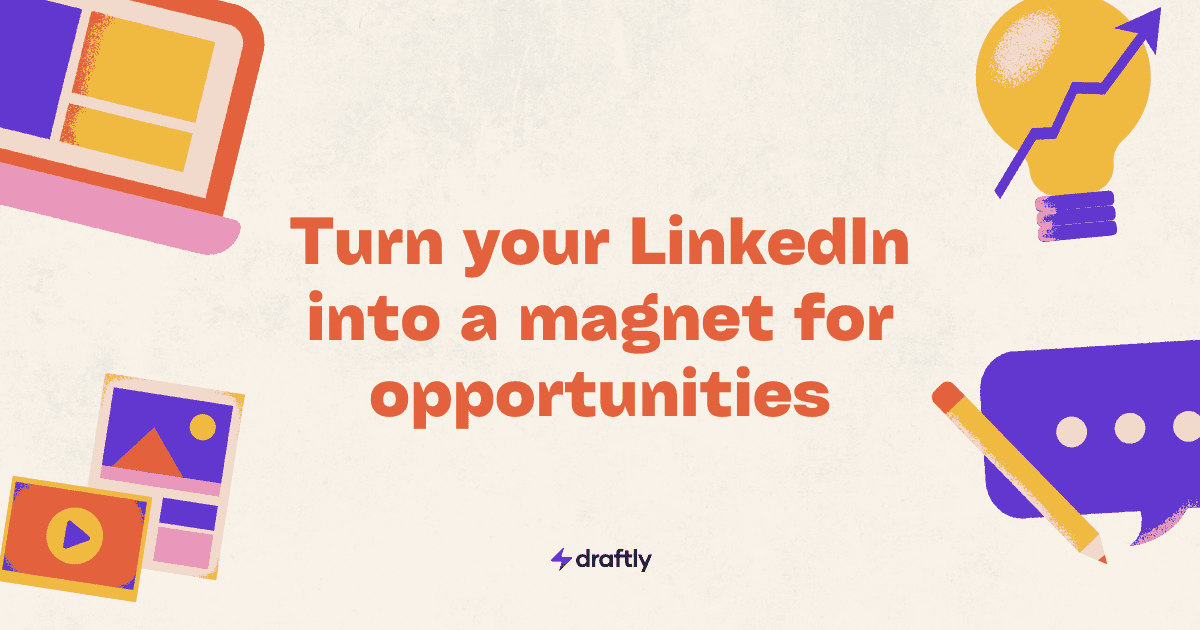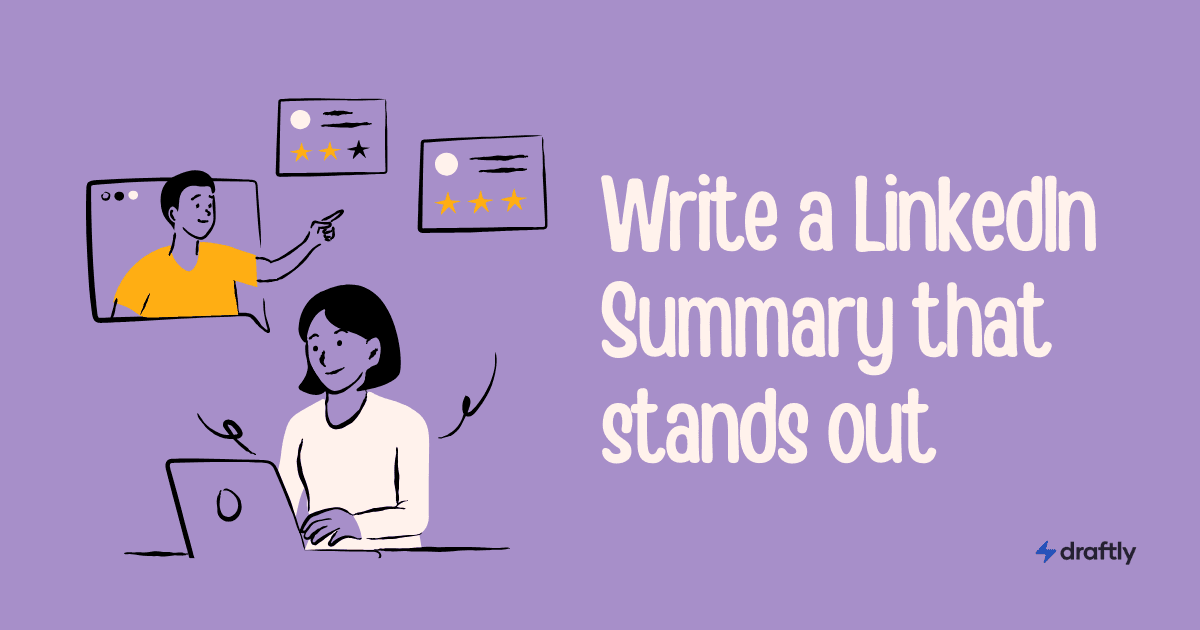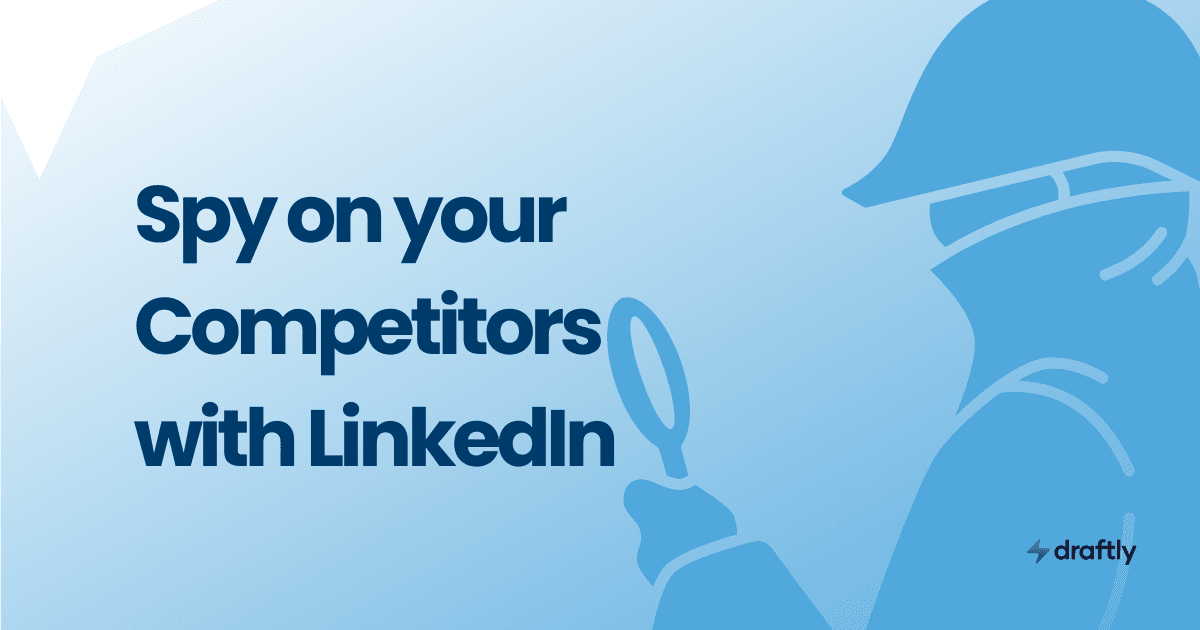LinkedIn. It’s become one of the most effective platforms for sales professionals to connect with prospects and generate qualified leads.
According to HubSpot’s State of Marketing report, 65% of sales reps rely on LinkedIn to fill their pipelines.
If that’s anything to go by, it’s safe to assume your potential customers are probably overwhelmed with sales outreach.
So how do you stand out while still making quota?
You can start with a LinkedIn messaging template.
We’ve curated eight of the best from Draftly’s sales team to help you get started, plus tips to support your social selling endeavours.
8 LinkedIn cold messaging templates that get results
Time to retire those tired and outdated message templates for LinkedIn. They’re making you miss out on some of the best opportunities in your industry.
Instead, give these eight LinkedIn messaging templates a try for better acceptance and response rates.
1. Connection message
If you’re not connected with your prospect or using InMail, you’re going to have to make a connection before even thinking about delivering your pitch.
But should you add a note to your LinkedIn connection request?
This has long been debated between sales representatives worldwide. We’d say no.
Connection messages are often generic and vague, which most prospects will ignore. Either because they’ve realized it’s all part of a sales strategy or they’re tired of reading the same requests repeatedly.
However, LaGrowthMachine did a study on what type of LinkedIn connection messages worked or not. They discovered that blank notes resulted in a 31% acceptance rate, while a short introductory connection request had a 32% acceptance rate.
You can give this LinkedIn connection note a try for that extra 1% acceptance rate:
"Hello (first name), I work for (company name), and I'd love to connect with you."
Or, if you have a mutual connection, this LinkedIn messaging template might work even better:
"Hello (first name), I saw you're also connected with (mutual connection). I'd love to have you in my network too."
2. I’ve got a question message
Utilizing LinkedIn chat to build relationships with prospects is an effective demand generation strategy. Be engaging, ask questions, and converse with potential customers to drive interest. This comes across as more organic than other lead generation tactics.
According to Jack Reamer, a LinkedIn template that gets a 60% response rate is:
"Hi (first name). I just finished reading your post about (topic), and I've got a question for you… Do you think (question about post)? Interested to hear your thoughts on this. (Your name)"
💡 Our Advice: Continue the conversation with your potential clients to gain more insights into their needs, preferences, and pain points before offering a solution.
3. Invitation to a webinar message
One of the first mistakes SDRs and MDRs make on LinkedIn is to immediately start selling. What prospects want and respond best to is value. How better to connect and offer them that value than with an invitation note to a webinar?
Here’s an example of a LinkedIn message template inviting a connection to a webinar:
"Good morning (first name), I hope you're doing well. Just messaging to let you know that I'm hosting a webinar about (topic) on (date and time). I think you'll find it interesting. Here's the registration link if you'd like to learn more or RSVP: (LINK). Hope to see you there!"
💡 Our Advice: Research your prospect before sending LinkedIn messages about a specific topic or industry. It won’t do you any good if you send the same message to every prospect. Some might not even be in the same industry or interested in the webinar topic.
4. The follow-up message
Filling a prospect’s LinkedIn inbox with “Have you read my message?” will only annoy them. So how do you follow up on your cold messages without coming across as a pushy B2B sales rep?
Keep it polite, like this LinkedIn messaging template:
"How are you (first name)? I know it's a busy time of year, but I'd love to have a conversation with you about (topic of last message). I recently learned (insert interesting fact or stat about topic). Let me know if there's a better time to message. Chat soon!"
💡 Our Advice: Don’t be discouraged if you don’t get a response to your first or even your second follow-up message.
SalesBlink found that 50% of sales occurred after the fifth follow-up to a cold email, whereas, on average, only two attempts are ever made. So it makes sense to give the same number of attempts with your cold messaging on LinkedIn.
5. The content distribution message
A great way to get prospects to enter your B2B marketing funnel is to share interesting content.
Distributing helpful content will establish you as an expert in your field, support your B2B marketing strategy, create brand awareness, and encourage customer loyalty.
Give this LinkedIn messaging template a try:
"Hello (first name), great post about (topic) the other day! You've probably seen, but I discuss this topic every now and again. You should read this blog article: (LINK) by (your company name). They make a lot of great points. Let me know what you think."
6. The pitch message
There’s no getting around it. You’ll have to pitch your product or service at some point. Hopefully, you’ll have built enough of a relationship to organize a warm call.
However, if you don’t have time to play the long game and want to get right in there and pitch from the get-go, we recommend starting with a subtle sales pitch message.
Here’s a LinkedIn message example that works:
"Hi (first name), congratulations to you and your team on the (insert details)!
I'm keen to know more about what helped you get to this point and if you've considered ( your type of solution) to help avoid (pain point)?
(Your company name) has helped companies like yours (insert success stat)
I'd love to discuss this further over a quick call.
Looking forward to hearing from you.
(Your name)"
Or you can go directly into the hard sell with this LinkedIn cold message template:
"Hello (first name), I'm reaching out to you from (company name). We specialize in (product or service) for companies like yours in the (industry). In fact, many of our customers have experienced ( main selling points).
If you'd like to find out more, please look at our website here: (LINK). Or we can arrange a call at your earliest convenience.
Looking forward to hearing back from you.
Many thanks,
(Your name)"
7. The common LinkedIn group message
When trying to figure out how to reach out to someone on LinkedIn, try this tactic:
Send a message mentioning a group you’re both members of.
Your LinkedIn messaging template will appear like you’re looking to expand your network instead of trying to sell something. This tactic will allow you to find common ground and build genuine connections.
"Hello (first name), I wanted to reach out because I'm also in the (LinkedIn group name). Judging by your profile, you've got quite a lot of experience in the (industry). I'd love to chat with you about the strategies you've been using at (company name) recently. Let me know when you're available. Thanks!"
8. The flattering message
Our last LinkedIn message template for sales is about making your prospect feel good about their work. After all, flattery gets you everywhere, doesn’t it? And it’s no different in B2B sales.
Send your prospect a message like the example below, detailing how much you enjoy their work, and watch your response rates soar!
"Hi (first name), how are you doing? I've been following you for a while now and wanted to reach out to say that I absolutely love your work. I find all of your posts insightful, especially the one discussing (topic). I'm working on implementing your advice into my day-to-day because, like you, I'm employed in (industry). Would you be interested in having a chat to discuss ideas? Looking forward to your response!"
7 expert tips for successful LinkedIn messaging
You can have the most tried and true LinkedIn messaging templates like the examples above, but they can only get you so far.
There’s a lot more that goes into successful social selling on LinkedIn. But if you follow these seven expert tips, you’re sure to skyrocket your incoming revenue in no time.
1. Plan your outreach strategies
Like your other sales strategies, you need to ensure you’re targeting the right people.
Don’t just target any leads that pop up on your profile. Look at your ideal customer profile and use a sales intelligence tool like Cognism to create a list of prospects that includes the correct contact data and LinkedIn profile URLs.
Then you can set up campaigns that serve your sales goals for each lead.
2. Personalize your LinkedIn message templates
The more personal your LinkedIn messaging templates, the better.
Your customers are human, too. They want to be treated like they aren’t just another number to help you reach your sales goals. Research your prospect, check out their company, and set up sales triggers to inform you of any conversation starters you can use when reaching out.
3. Optimize your LinkedIn profile
When you send a LinkedIn messaging template to a prospect, chances are they are going to have a look at your profile.
Take a minute to think about how it looks to prospects.
- Do you come across as professional?
- Do you have a profile photo?
- Do you have a summary?
You need to ensure these things are up-to-date and they speak to your target leads. Make sure you’re letting them know what you do, how you can help them, and how to get in touch with you.
4. Keep your LinkedIn messages short
Yes, you can write up to 1900 characters in InMail messages (while connection request notes only allow up to 300), but that doesn’t mean you should!
Search Engine Journal found that messages under 400 characters performed 22% better than average.
5. Think about your subject lines
Your prospective buyer isn’t going to open your LinkedIn InMail template if you have a terrible subject line. To prevent disappointment, keep your subject lines for LinkedIn messages short.
It can be one word or something ambiguous like, 'our discussion over email.'
If neither of these options strikes your fancy, try to think outside the box. Take a humorous approach. You can share an industry joke, poke fun at something trending or use a pun.
That, or make your subject lines double as your CTA. For example, 'RSVP to (company name) ’s email marketing event.’
6. Don’t push your pitch
You don’t want to scare a prospect away by jumping straight into your pitch. After your connection request is accepted, simply reply with a thank you.
Then interact with their posts for a while. Let them see you share dynamic content and valuable resources before messaging again.
7. Have an active LinkedIn profile
One way to really stand out on LinkedIn is to become a recognizable expert in your field. You can achieve this by frequently sharing useful advice and actionable tips.
When your personal brand is as trustworthy as the company you work for, more and more prospects will be happy to connect with you and hear you out.


